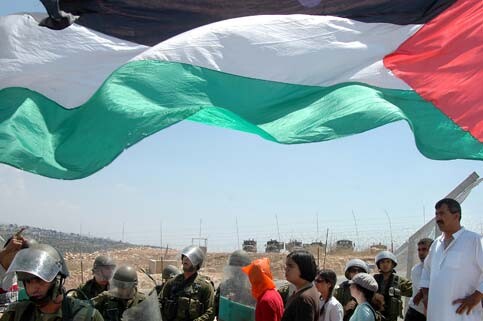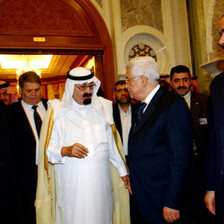Challenge 2 July 2006

Palestinians and international activists demonstrate against the separation wall in the West Bank village of Bilin west of Ramallah, June 30, 2006. (MaanImages/Mushir Abdelrahman)
Ten months after Israel’s disengagement from Gaza, its army has re-entered the Strip, while in the West Bank it has arrested the bulk of the Palestinian government: 64 legislators, cabinet ministers and officials, members of Hamas all. The pretext was a raid led by the Hamas military wing on June 25, in which two soldiers were killed and one captured. In Israel’s view, the event gives it an excuse to create a new political reality, nullifying the Hamas victory in the January elections.
The background to this latest crisis includes a long list of events: the daily rocketing of Sderot from Gaza; Israel’s fruitless retaliations from the air; its assassination of Jamal Abu Samhadana (No. 2 on its Wanted List, appointed by Hamas as head of the Palestinian police); the killing of the Ghalia family on Gaza beach, the increasing death toll among Arab civilians.
Yet things could have gone very differently. The raid of June 25 impeded a change that, from all indications, was about to occur in the positions of the Israeli and Palestinian governments. Israel’s Prime Minister Ehud Olmert had scheduled a cabinet meeting for that same morning to discuss the Palestinian “Prisoners’ Document.” This consists of eighteen articles, drawn up in Israel’s Hadarim Prison by prison leaders including Marwan Barghouti. On May 18, it was signed by representatives of all Palestinian factions in the prison, among them Hamas and Jihad. The document presents a list of understandings as a basis for nationwide agreement, including a Palestinian state within the 1967 borders, reform of the PLO, entry of Hamas and Jihad into the PLO, formation of a national unity government containing Hamas and Fatah, crystallization of a political program on the basis of international resolutions, the conduct of negotiations with Israel under the aegis of the PLO, an end to attacks within Israel, and an end to inter-factional violence.
Harmony is more easily achieved among prisoners sharing a common fate than among political forces outside. At first the Hamas government, led by Ismail Haniyeh, would not agree. It was under enormous pressure, however. The West’s economic boycott was keenly felt. After PA President Abu Mazen (of Fatah) threatened to submit the Prisoners’ Document to a national referendum, Haniyeh began to soften. It looked as though, on the Palestinian end, a basis was being laid for negotiations with Israel.
ON the Israeli side, one may ask why Olmert had decided to discuss the Prisoners’ Document, which he had earlier dubbed an internal Palestinian matter. The answer may be found in his failure to win support for his “Convergence Plan” within Israel, the Arab world, Washington or Europe. He had understood that there was little point in wasting time and prestige on a program no one backs. His central goal, and that of his party, Kadima, is to withdraw from most of the West Bank, separate from the Palestinians, and gain international recognition for the new barrier as Israel’s border. Israeli public opinion, having had its fill of the conflict, is ready for such a withdrawal – albeit on Israeli terms. For the economy too, which depends on foreign investment, a political solution is needed.
Against this background, some observers found significance in a brief encounter at Petra on June 22 between Olmert and PA President Abu Mazen, which spawned an agreement to meet again in early July. (Bush representatives David Welch and Elliott Abrams are due to be in the region.) The impression was that Israel’s PM had reconciled himself to the present arrangement in the PA, even with the Hamas government. One could foresee a scenario like this: if Hamas were to join Abu Mazen in signing the Prisoners’ Document, Israel would be willing to move to the second stage of the Road Map for Peace, which calls for the establishment of a temporary Palestinian state in part of the Occupied Territories.
The advantage of such a program for Israel, as compared with Olmert’s Convergence Plan, is that the international community would recognize the borders to which it withdraws, even if only as temporary. And what’s so bad about “temporary”? Hadn’t Hamas offered a “temporary” ceasefire of sixty years?
ON the eve of the raid, then, conciliatory moves between Fatah and Hamas appeared imminent – to be followed, perhaps, by renewal of talks between the PA and Israel.
Enter Khaled Mashal. Based in Damascus, Mashal heads the Hamas Political Section. He opposes the tendency toward accepting Israel that is represented by the Prisoners’ Document. The military wing of Hamas, which led the raid, looks to him for guidance – not to the government. Some think that he decided on the timing of the raid on June 25 (it was dubbed “The Illusion Evaporates”) in order to throw a monkey wrench into the works. In any case, the wrench got in.
It got in deeper, perhaps, than Mashal intended. A few months ago he was preening himself on the Hamas electoral victory. The trouble was, he wanted the fruits of governmental power without the responsibilities. Now he has pushed the Palestinian people into a dangerous adventure.
The resulting crisis has brought to light the full extent of the split within Hamas. As tensions grew around the captured soldier, Haniyeh agreed to sign the Prisoners’ Document, signaling that he was not to be classed with the militant wing. He also called (through his spokesperson) for the captured soldier’s unconditional release. The response of his “street,” however, was to demand an exchange for Palestinian political prisoners.
Israeli PM Ehud Olmert rejected outright any suggestion of an exchange. Now Israel has taken the Hamas government hostage. In a single stroke, it has nullified the results of the January polls, showing the world the real importance it attributes to democratic elections.
In certain respects, the Israeli actions are reminiscent of Operation “Defensive Shield” in 2002. The pretext then was a suicide bombing at a Passover Seder in Netanya. The nominal purpose of the operation, formulated with deliberate vagueness by PM Ariel Sharon, was “to destroy the terrorist infrastructure.” It soon became clear, however, that the purpose went beyond this. After re-conquering the cities, Israel’s army tore up the PA offices and imprisoned Yasser Arafat in his Ramallah headquarters, while fabricating evidence to connect him with terrorism. Its most revealing act was to destroy the headquarters of Jibril Rajoub. This former prisoner headed the PA’s Preventive Security. He had been Israel’s closest friend in the PA. He had consistently opposed attacks on Israelis. In destroying Rajoub’s apparatus, Israel was aiming not at the terrorist infrastructure, but at the PA itself, which had failed to keep peace and quiet. The same message is being delivered today to Ismail Haniyeh: If you can’t deliver peace and quiet for Israel, you haven’t any business on this earth.
For all its tactical success, Defensive Shield was a strategic failure, because it weakened Fatah and brought Hamas to prominence. In the current operation, too, it is hard to see what Israel can gain from dismantling the Hamas government. Those who elected it – and their motives for electing it – still exist. They have shown many times that they will not be cowed. The deep cause of the present maelstrom lies not in Hamas, nor in terrorism, but in Israel’s failure to take responsibility for the misery it has created. Consider just this: after forty years of occupation, the annual per capita Gross Domestic Product in Israel is $24,600; in the West Bank it is $1,100, in the Gaza Strip $600.
On the one hand, Israel would like to withdraw from most of the Occupied Territories and become a bigger player in the global economy. To achieve that end, however, it’s not enough to “get rid of “the Territories,” whether this is supposed to happen through disengagement, convergence, a temporary state beneath the aegis of the Quartet, or even two states with a wall between. The flourishing of one and the pauperization ofthe other are a recipe for endless violence. The kind of peace that Israel seeks – without recognition of its responsibility and without any readiness to compensate for years of exploitation – will never end the cycle of blood .In the want of a generous peace proposal, Israel has only itself to blame if the Palestinians vote for an organization that offers them pie in the sky.
CHALLENGE is a bi-monthly leftist magazine focusing on the Israeli-Palestinian conflict within a global context. Published in Jaffa by Arabs and Jews, it features political analysis, investigative reporting, interviews, eye-witness reports, gender studies, arts, and more. This article first appeared in Challenge #98 and is reprinted with permission.





